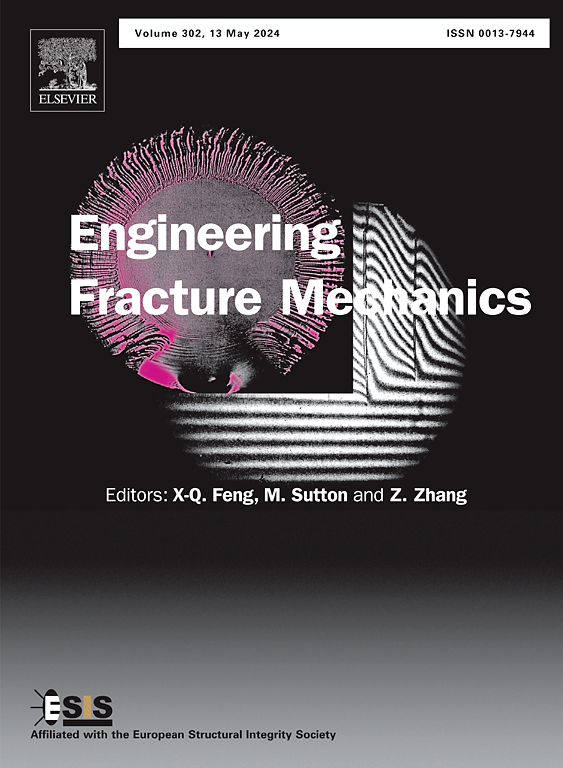水平井压裂过程中单压裂传播诱发的偏离井光纤应变演变机制
IF 4.7
2区 工程技术
Q1 MECHANICS
引用次数: 0
摘要
考虑到水平邻井监测的建设成本较高,且缺乏用于获取压裂信息的垂直邻井光纤,本文提出了使用偏差井光纤进行监测的方法。为了证明偏井光纤的优势及其部署的可行性,本文构建了一个基于有限元耦合内聚元方法的前向模型,模拟水平井中单条水力压裂在偏井光纤上传播所引起的应变,并对单条水力压裂在偏井光纤上传播所引起的应变进行了数值模拟分析。结果表明,偏差井光纤中单条压裂传播引起的应变演化可分为四个阶段:应变增强阶段、应变收敛阶段、拉应变扩展阶段和线性应变收敛阶段。偏斜井光纤的应变演化特征表现为:中间出现具有一定偏差的 "心形 "拉应变汇聚区,随后汇聚成拉应变汇聚带,两侧为压应变汇聚区,压应变汇聚带外侧为拉应变扩展汇聚区。分析发现,当井倾角大于 45°时,偏井光纤的应变响应特性主要受裂缝宽度扩展的影响,而当小于 45°时,应变响应特性主要受裂缝高度扩展的影响。方位角的变化会导致光纤应变瀑布图中的 "心形 "拉伸应变区和压缩应变汇聚区出现偏差,方位角越小,偏差越大。偏差井光纤布设深度达到水平井水平段深度,可以反映压裂高度向上扩展的情况。分析结果说明了偏井光纤同时获取压裂宽度和高度扩展信息的优势,并提出了根据压裂监测需求选择合适的偏井光纤施工参数的方法。这项研究可以降低在邻井部署光纤的施工成本,对指导邻井光纤布局具有重要意义。本文章由计算机程序翻译,如有差异,请以英文原文为准。
Evolution mechanism of deviated well fiber-optic strain induced by single-fracture propagation during fracturing in horizontal wells
Considering the high construction cost of horizontal adjacent well monitoring and the lack of vertical adjacent well fiber optic for obtaining fracturing information, this paper proposes the use of deviated wells with fiber optics for monitoring purposes. To demonstrate the advantages of deviated well fiber optics and the feasibility of their deployment, this paper constructs a forward model based on the finite element coupled with cohesive element approach to simulate the strain induced by the propagation of a single hydraulic fracture in horizontal wells on deviated well fiber optics, and conducts a numerical simulation analysis of the strain induced by the propagation of a single hydraulic fracture on deviated well fiber optics. The results show that the strain evolution induced by single-fracture propagation in deviated well fiber optics can be divided into four stages: strain-enhancing, strain-converging, tensile strain-expanding, and linear strain-converging. The strain evolution characteristics of deviated well fiber optics are manifested as follows: a “heart-shaped” tensile strain convergence zone with a certain deviation appears in the middle, which subsequently converges into a tensile strain convergence band, with compressive strain convergence zones on both sides, and an expanding tensile strain convergence zone on the outer side of the compressive strain convergence band. The analysis finds that when the well inclination angle is greater than 45°, the strain response characteristics of deviated well fiber optics are mainly governed by the width expansion of the fracture, and when less than 45°, they are mainly governed by the height expansion of the fracture. Changes in the azimuth angle can cause a deviation of the “heart-shaped” tensile strain area and the compressive strain convergence zone in the fiber-optic strain waterfall plot, with larger deviations corresponding to smaller azimuth angles. The depth at which the deviated well fiber optics are deployed, reaching the depth of the horizontal section of the horizontal well, can reflect the upward expansion of the fracture height. The results of the analysis illustrate the advantages of deviated well fiber optics in obtaining both fracture width and height expansion information simultaneously and propose a method for selecting suitable deviated well fiber-optic construction parameters based on fracturing monitoring needs. This research can reduce the construction cost of deploying fiber optics in adjacent wells and has significant implications for guiding the layout of adjacent well fiber optics.
求助全文
通过发布文献求助,成功后即可免费获取论文全文。
去求助
来源期刊
CiteScore
8.70
自引率
13.00%
发文量
606
审稿时长
74 days
期刊介绍:
EFM covers a broad range of topics in fracture mechanics to be of interest and use to both researchers and practitioners. Contributions are welcome which address the fracture behavior of conventional engineering material systems as well as newly emerging material systems. Contributions on developments in the areas of mechanics and materials science strongly related to fracture mechanics are also welcome. Papers on fatigue are welcome if they treat the fatigue process using the methods of fracture mechanics.

 求助内容:
求助内容: 应助结果提醒方式:
应助结果提醒方式:


